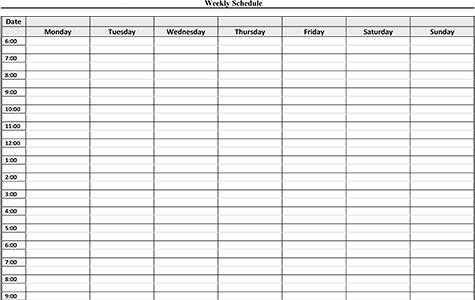
Managing time starts with knowing how long things take to accomplish. The easiest way to know what you do and how long it takes to do it is to keep a log for a week. Write down everything you do and how long it takes you. There is no right amount of time. Be real. For example, my son needs 20 minutes to wake up whereas I can hit the ground running. Neither is right or wrong, it’s just the way it is. He has to take that 20 minutes into account when planning his morning or his day will get off on the wrong foot or late, or both.
Being late all the time is often a product of not being realistic about how long things take. I am sure I am not the only one who had it in my head that things took less time than they really do and was always running late. But another reason to know how long tasks take is so you can actually get more done.
Think of it like a puzzle. If you know how long things take, you can fit it into a time slot that size. Emptying the dishwasher takes the same time as my water kettle takes to heat, so I can do that while I am waiting for my tea water in the morning.
After a while, you will know from experience how long things really take. Then you can fit the puzzle pieces together more effectively.
Use a Weekly Calendar
Download this weekly calendar.
Week 1: Just record your times. There is no correct amount of time. Be real. If you forget, pick up again when you remember. If you forget to record your times a lot, it may take a couple of weeks to get a good idea of how long things really take. Also notice where things look longer than you expected and why.
Keep track of everything you do for a whole week because the time to do things may vary for many reasons, including procrastination. Keeping the calendar and using it will help you eliminate a lot of procrastination if you are honest with yourself about how you are spending (or wasting) time.
Week 2: Start with a new copy and put your set time commitments on it- like work or meetings, classes or groups that have a set time and are not movable. Don’t forget to include travel or preparation time. Put the time you get up and go to bed. Include time to clean up each day and time to unwind at night before going to sleep. Include meal prep, eating and clean up.
Now, add the things you WANT to do. (Is it getting full yet?) Put these in pencil so if something comes up, you can move them around. Adjust the week as necessary, but do not remove the necessary things. (Of course, you may use a computer to do this.)
Why Use a Calendar?
Using a calendar helps you develop the practice of thinking of time as the measurable thing that it is. Managing time means being aware of how you are spending it.
Remember, time is a commodity, but you only get so much. A calendar will help you stay on point to get things done that you want (or need) to accomplish.
Think of the calendar as a time budget. You can’t spend what you don’t have. You may need to move a study time to go out with friends, but you have to move that study time to somewhere else on the calendar. If you are out of time for the week to be with friends, you don’t have time to go out. You can’t spend (time) that you don’t have.
In the post, Planning to Get Things Done, I will talk about making the calendar work for you to get things done, so you are managing time, not just spending it.

Leave a Reply